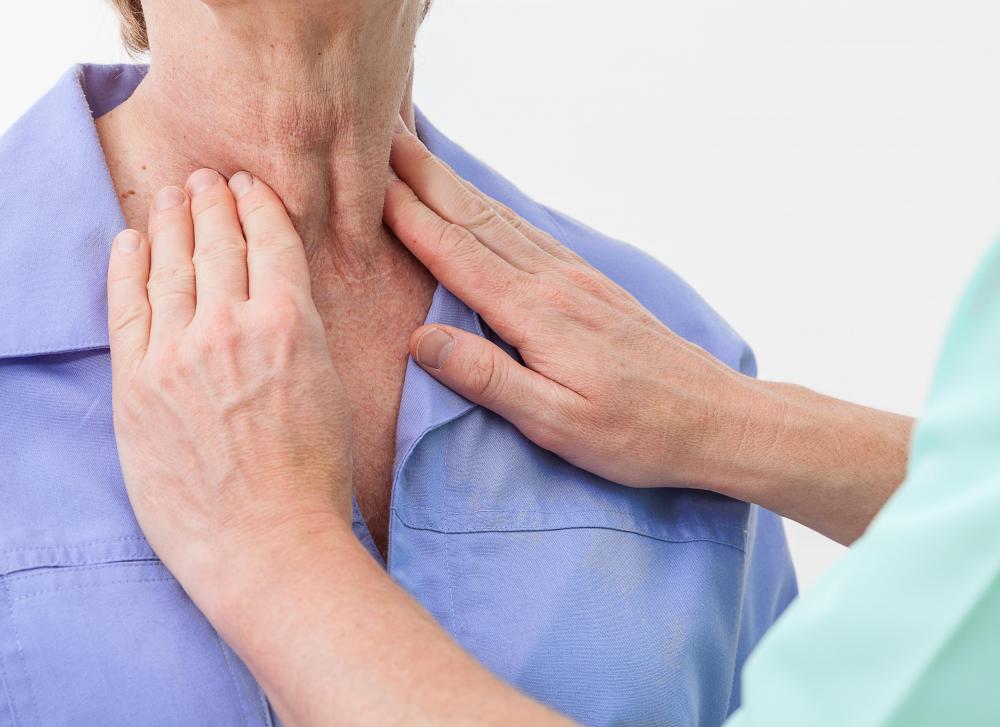At TheHealthBoard, we're committed to delivering accurate, trustworthy information. Our expert-authored content is rigorously fact-checked and sourced from credible authorities. Discover how we uphold the highest standards in providing you with reliable knowledge.
What are the Causes of a Low Pulse Rate?
A low pulse rate may be caused by a number of health conditions. Sometimes, a form of heart disease is the reason for slower blood flow throughout the body. Cardiac abnormalities are common, but other conditions that do not involve the heart, such as a metabolic imbalance or certain lung diseases, can create the symptom. A slower heartbeat does not always indicate a health problem, however. Sometimes, just the opposite is true. Athletic individuals who exercise frequently and enjoy optimum cardiovascular health often have a lower than normal pulse rate because the heart does not have to work as hard while at rest, and the body functions more efficiently.
The normal pulse rate for an adult is between 60 and 100 beats per minute while in a relaxed state, but it generally fluctuates within that range based on a number of factors, like climate, medication use, and even the person’s emotional state. The medical term for a low pulse rate that falls below 60 beats per minute is bradycardia, which could be a symptom of a serious condition. An individual who experiences signs of decreased heart rhythms should be evaluated by a physician.

As a person gets older, a low pulse rate is more common because of naturally-occurring changes to an aging heart. An individual with a history of heart attacks or one who suffers from atherosclerosis, a hardening of the arteries, or other cardiac abnormalities is especially prone to the condition. A cardiologist usually performs a series of tests to confirm the cause. Sometimes, however, the reason for a low pulse rate is related to some other heath condition and not at all connected to an unhealthy heart.

Lung diseases, such as emphysema, or an under-active thyroid can also cause bradycardia. Sometimes, the reason for developing the symptom is unknown, especially if it does not accompany other identified health complications. A physician usually tries to find the underlying problem and recommend treatment.
The symptoms of bradycardia can be troublesome and scary. Dizziness, fainting, and shortness of breath can result from low pulse rates. Mental faculties can be affected as well, and can result in confusion, impaired memory, and difficulty sleeping. These symptoms can become dangerous for the patient, especially if the individual is operating heavy machinery or engaging in activities that require mental alertness, like driving. In some cases, low pulse rates can result in chest pains and difficulty breathing, which signifies a major medical emergency.
AS FEATURED ON:
AS FEATURED ON:
















Discussion Comments
I know several elderly people who have heart disease that has lead to bradycardia or low heart rate. In order to prolong their life, they had pacemakers inserted into their chest by surgery. The pacemaker has an electrical impulse that gets the heart to pump faster. These people are doing quite well. It really helps them to function better.
In cases where younger people have a damaged heart and slow pulse rates, their doctors often recommend that they get a heart transplant.
Some athletes have a low resting pulse rate. After years of athletic training in sports like running, bicycling, mountain climbing, and cross country skiing, the athlete can lower their pulse rate considerably.
A friend of mine runs almost daily for 8 - 10 miles. Her pulse rate is always about 58. Before she started running, her pulse rate was about 80. Her heart is operating very efficiently now!
A low pulse rate can cause health problem just as high blood pressure can. I have a brother who has symptoms from a low pulse. Sometimes when he gets up too quickly from bed or a chair, he gets dizzy and woozy for a time.
He kind of gotten used to it, but he doesn't like it when it happens at work - it's a little scary.
He's been to his doctor and to a cardiologist, but they couldn't find anything that could be causing it.
Post your comments